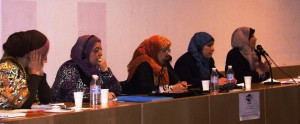
With its own complex relationship with the Muslim world over the centuries, it was perhaps fitting that Spain should host the Fourth International Congress on Islamic Feminism, in Madrid, October 21-24.
Spain’s Catholic monarchs forcibly converted Muslims to Christianity in the 16th century before then expelling many of those converts. This followed the Islamic occupation of Spain, when the religion fomented major cultural and scientific developments, especially in its major centres such as Córdoba. This year’s Madrid conference, however, looked ahead, analysing the future prospects of Islamic feminism, as well as its current state. More than 400 participants from across the world gathered to study the potential of the movement to change the real situation of Muslim women who face discrimination and to find ways to deal with the authoritarianism of conservative religious structures.
But what is Islamic feminism and can Islam and feminism even belong together in the same sentence? Today, with more and more countries debating the use of the niqab in public spaces and some banning the burqa, there is a tendency to simplify Islam as a religion that oppresses women. Muslim women are often presented as victims of a religion that treats them as second-class citizens, but which of the main monotheistic religions do treat women on a truly level ground with men?
What transformed to some extent women’s situation in the Christian West were new social conditions shaped by political and socio-economic models, and especially the notion that no religion would be above men’s laws (ideals enshrined in the declaration of human rights and the constitution of countries). In Islam, the Koran and Sharia law are above all other documents. Therefore, Islamic feminism’s reinterpretation of Muslim texts to fight against the implementation of sexist and discriminatory family codes of behaviour based on patriarchal interpretations is the only viable path towards modernisation of Muslim societies. Justice and fairness are inherent in Islam, but Islam’s justice is not reflected in the Sharia if it doesn’t regulate gender equality.
The Iranian publication Zanan has been a major influence on the debate about women’s role in Islam, with its founder, Shahla Sherkat, addressing the right of women to reinterpret Islamic law, often putting her own liberty on the line in the process. After Sherkat, Fatima Mernissi, Shirin Ebadi, Rifaat Hassan and Sisters in Islam are among those who have rebelled against the dominant patriarchal culture in Islamic states that has led to discriminative interpretations of Sharia.
The International Congress on Islamic Feminism event has reflected the main preoccupations of its times. The first was held in 2005, when the movement was becoming a reality in many Muslim countries. It focused on the problems of Sharia law and discriminatory family codes, while showing a determination to continue the gender jihad, the struggle against patriarchy within Islam. Sessions were held about polygamy, divorce, family planning, abortion, and Koranic hermeneutics from a feminist perspective and the creation of an “Observatory of Islam and Gender” in Spain was announced. Organised by Junta Islámica Catalana, it set its base in Spain. The Second Congress took place the following year and looked at Islamic feminism’s role as a transnational movement. The third event, in 2008, focused on the problems of Muslim women in the globalised era as well as exploring economic and political oppression.
This fourth congress has not only followed up on previous initiatives and looked ahead to the future, but it has also discussed related topics such as millennium goals and Sufism.
Given the characteristics of Islam, the modernisation of Muslim societies can only come from within and can only happen if the rights of the non-male 50 percent of the population are put in place. Only a movement based on the Koran itself, which Islamic feminism is, can lead to the very necessary and long-awaited modernisation of that religion.
Leave a Reply
You must be logged in to post a comment.